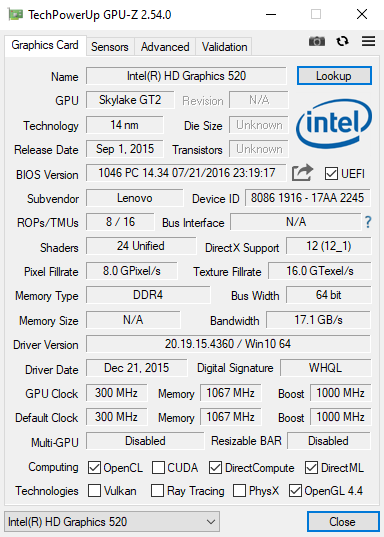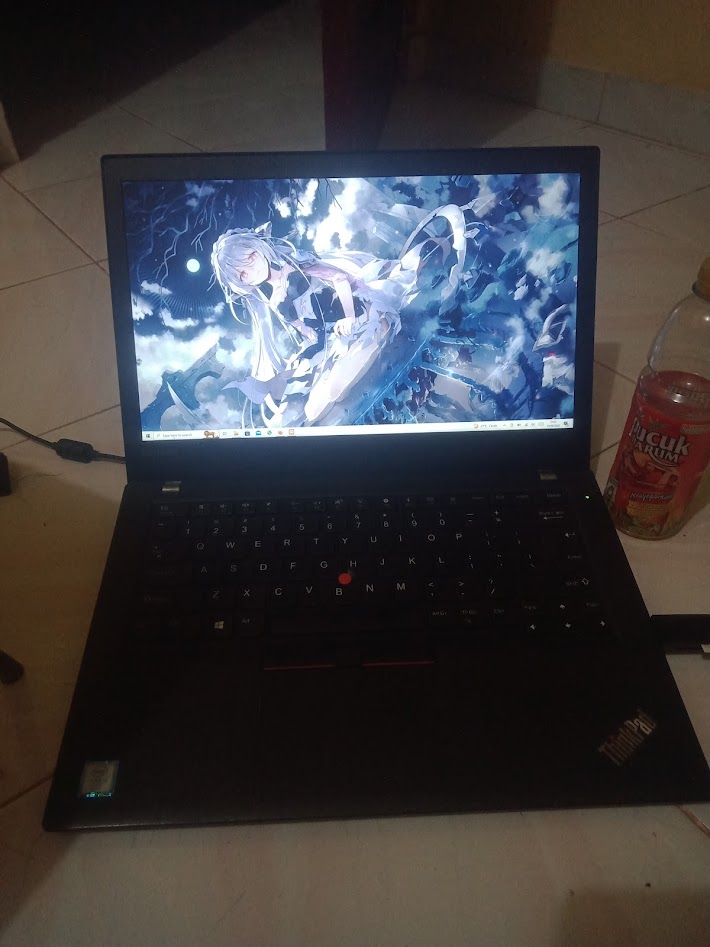Comparing: NVIDIA Quadro P4000 vs Intel HD Graphics 520 (Mobile)
In this comparison, we analyze two Videocards: NVIDIA Quadro P4000 and Intel HD Graphics 520 (Mobile), using synthetic benchmark tests to evaluate their overall performance. This side-by-side comparison helps users understand which hardware delivers better value, speed, and efficiency based on standardized testing. Whether you're building a new system or upgrading an existing one, this benchmark-driven evaluation offers valuable insights to guide your decision.

Intel HD Graphics 520 (Mobile)
| Type: | Videocards |
|---|---|
| Brand: | Intel |
| Model: | HD Graphics 520 (Mobile) |
Specification Comparison Table
This specification comparison presents technical details of several devices or components to help you understand the key differences between each option. Use this table as a reference to determine which device best suits your needs.
| Specification | NVIDIA Quadro P4000 | Intel HD Graphics 520 (Mobile) |
|---|---|---|
| Architecture | Pascal | Skylake |
| Codename | GP104 | Skylake GT2 |
| Buswidth | 256 bit | 64 bit |
| Clock | 1202 MHz - 1480 MHz | 300 MHz - 1000 MHz |
| Memory Clock | 8GB GDDR5 | SHARED |
| Technology | 16 nm | 14 nm |
| Interface | PCIe 3.0 x16 | IGP |
| Technology | 16 nm | 14 nm |
| Segment | Desktop | Laptop |
Submission Comparison Table
This submission comparison table displays the number and details of benchmark data submissions from various devices or components. This information helps you understand the performance based on the benchmarks that have been tested, as well as providing an overview of the consistency and popularity of the available benchmark results.
Submission Comparison Chart
This chart visualizes the benchmark scores comparison between two hardware devices based on submitted data.
Media Gallery
A collection of photos of tested hardware. These images can help you identify the physical form, model, and variant of the hardware in question. These photos are from our own documentation, and if they are not available we may not be able to document them.
About Hardware NVIDIA Quadro P4000
NVIDIA Quadro P4000 is a mid-to-high-end workstation graphics card specifically designed for professional needs such as CAD design, 3D modeling, simulation, and rendering. Based on the Pascal architecture, this GPU is equipped with 1792 CUDA cores and 8GB of high-speed GDDR5 VRAM memory, providing an optimal balance of computational performance, power efficiency, and stability for intensive workflows in the creative and engineering industries.
Quadro P4000 comes with the key advantage of officially certified driver support for professional applications such as Autodesk Maya, SolidWorks, CATIA, PTC Creo, Siemens NX, and Blender, ensuring more stable and accurate performance than gaming-grade graphics cards. The GPU supports NVIDIA Quadro Sync, Mosaic, and DisplayPort 1.4 technologies, enabling multi-monitor configurations up to 8K resolution for complex visualization needs.
In addition, the Quadro P4000 has high-precision computing capabilities (FP64) that are ideal for engineering simulations and numerical analysis. Compared to consumer cards such as the GeForce GTX 1070, the Quadro P4000 offers advantages in color accuracy, rendering precision, and long-term compatibility and stability in professional work environments.
Installed on powerful workstation systems, this GPU is perfect for engineers, architects, animators, and content creators who require high graphics performance without sacrificing reliability and efficiency.
Thursday, 23 June 2022 07:42:37 | Update: 1 month ago
About Hardware Intel HD Graphics 520 (Mobile)
Intel HD Graphics 520 is an integrated GPU used in 6th generation Intel Core processors (Skylake), such as the Intel Core i5-6300U found in many business laptops and ultrabooks. It has 24 Execution Units (EUs) with speeds up to 1.0 GHz, offering sufficient graphics performance for light to medium computing needs in the portable device class.
As part of the Skylake architecture, the HD Graphics 520 supports DirectX 12, OpenGL 4.5, and Vulkan 1.0, which makes it flexible enough to run a wide range of modern applications. The GPU is also equipped with hardware acceleration for H.265/HEVC video decoding, making it suitable for high-resolution video playback, including 4K content. The power efficiency of this architecture makes it ideal for use in high-mobility laptops like the Lenovo ThinkPad T470, which rely on long-lasting battery performance.
Compared to previous generations such as the Intel HD Graphics 5000 (Haswell), the HD Graphics 520 comes with improved graphics performance and better power efficiency. Although still in the entry-level GPU class, the HD 520 is capable of running light games such as League of Legends, Dota 2, and Minecraft at 720p to 1080p resolution with low to medium graphics settings. For activities such as light graphic design, multitasking, and daily office use, this GPU provides a smooth and responsive experience.
In a device like the Lenovo ThinkPad T470, the HD Graphics 520 is paired with 8GB of single-channel DDR4 RAM, which while it could still be optimized with dual-channel, is enough to support productive user activities. The Windows 10 operating system also works very well with this generation of Intel graphics drivers, which continue to receive compatibility and performance updates from Intel.
Overall, the Intel HD Graphics 520 offers integrated graphics performance that strikes a balance between power efficiency and multimedia capabilities. It is suitable for office workers, students, and business laptop users who need stability and modern technology support without the need for a discrete GPU.
Hardware Detail:
Device: Lenovo ThinkPad T470
CPU: Core i5-6300U
RAM: 8GB DDR4 Single Channel
OS: Windows 10
Thursday, 10 August 2023 10:15:16 | Update: 1 month ago


